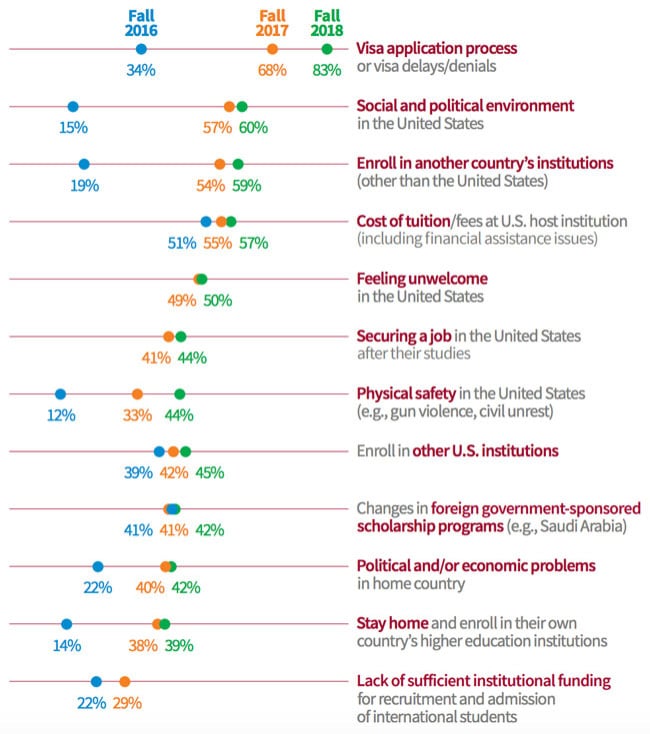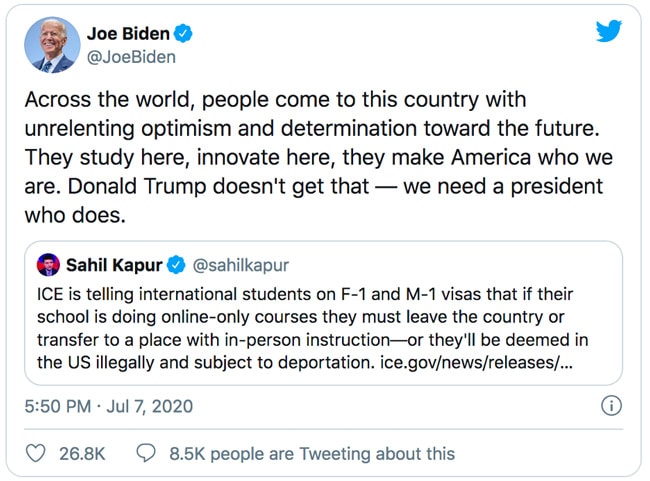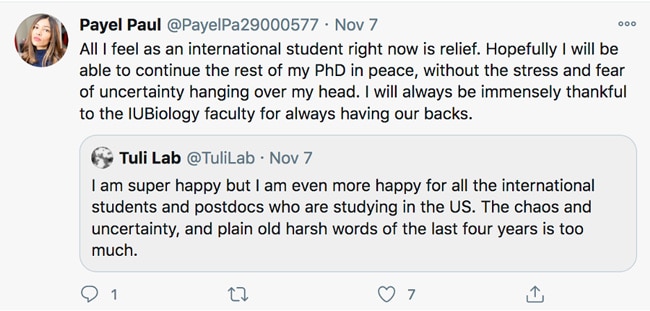Biden presidency offers hope for both US educators and foreign students
- Under the Trump administration, international enrolments have steadily declined in the US
- President-elect Joe Biden has promised to repeal the ban on travellers from Muslim-majority nations and has stated his belief that talented international students help to “make us who we are”
- The US election result is relieving to US educators and their international students, but there is also recognition that not all of Trump’s policies will be easy to repeal
President-elect Joe Biden and Vice President-elect Kamala Harris’s electoral win this past weekend in the United States is encouraging US educators to hope that a more favourable political and policy environment is on the horizon.
Dr. Esther Brimmer, executive director and CEO of NAFSA, issued this statement in response to the Biden-Harris win:
“The past four years have been one of the most challenging periods in the history of our field, during which international educators have shown unparalleled strength and resilience. They have defended the field against travel bans, executive orders, detrimental regulatory actions, and xenophobic rhetoric. Now we face a horrific pandemic, which further threatens our field and our lives."
"We are eager to work with the Biden-Harris administration as President-elect Biden has pledged to directly address many of these issues as he takes office. We are also excited to welcome Dr. Jill Biden to the White House given her long-standing commitment to expanding access to higher education; specifically advancing our nation’s community colleges. To that end, we see encouraging signs that suggest a more favourable climate for international education, science, and engagement with the world.”
How a Biden presidency could be different
The Trump Administration’s immigration policies and wariness towards international students have played a significant role in driving down foreign demand for education in the United States. International enrolments have fallen for three consecutive years, and survey data indicates that the political and social environment in the country changed from being the second-least important barrier to enrolments in 2016 to the second-most important under the Trump presidency.

One of President Trump’s most controversial policies is the ban on travellers from several Muslim-majority countries. In what would be a serious boost for US educators dealing with the consequences of that decision, Mr Biden has indicated he does not support the ban and intends to revoke it once he takes over as president. An official statement from the Biden campaign reads:
“Prohibiting Muslims from entering the country is morally wrong, and there is no intelligence or evidence that suggests it makes our nation more secure. It is yet another abuse of power by the Trump Administration designed to target primarily black and brown immigrants. Biden will immediately rescind the ‘Muslim bans.’”
There is also hope that the Biden presidency could ward off the current administration’s proposal to impose fixed-term limits for F and J visas. That proposal, if passed, would significantly curtail the ability of students from certain countries to come to the US to study and potentially target some students for increased scrutiny for “national security reasons.” President Trump may yet push through the proposal in the final weeks of his presidency, however, which might make it difficult for Mr Biden’s administration to easily or quickly revoke the law.
Finally, educators and international students will be looking for Mr Biden to restore confidence that the very popular OPT and H-1B programmes – which are major drivers of demand for international students looking for work experience and immigration opportunities in the US – will not be terminated or subject to more restrictive policies. These programmes have come under intense scrutiny during the Trump administration, which has in turn been a factor in dampening student demand.
Students express relief
Many international students in the US have had an exceptionally stressful year. Not only have they had to deal with the universal fear of contracting COVID-19 in a country with the highest infection rate in the world, they also have faced the possibility that they might be forced to leave the country. In July, the Trump Administration announced that international students would have to leave the US if their programme transitioned to online-only delivery. That decision was soon revoked, but new international students are still prohibited from coming to the US if their programmes are online.
On top of it all, international students have not been eligible for federal emergency COVID-19 funding, relying instead on much-appreciated local and institutional initiatives to provide them with financial relief and other supports during the pandemic.
Here was what Biden had to say about the unwelcoming message sent to international students studying in the US during the pandemic:

Mr Biden’s campaign platform also states: “Foreign graduates of a US doctoral programme should be given a green card with their degree. Losing these highly trained workers to foreign economies is a disservice to our own economic competitiveness.”
Asked about their feelings about the Biden-Harris win, international student Jehan Ayesha-Wirasto from Malaysia, told VOA News, “I’m hopeful that travel will be more convenient, with less hurdles to jump over, a more streamlined process that does not discourage visa application especially after graduation.”
Another student, Reyhan Ayas, a Princeton doctoral student from Turkey, told the Chronicle of Higher Education after learning of the Biden win,
“I’m relieved. Recently, it felt like no matter how hard I studied or how hard I worked, it didn’t matter. I wouldn’t be welcome here.”
International students also took to social media to express their relief at the result of the election. In the screen shot below, one student thanks her graduate school for “always having [students’] backs” at a time the US government was at best unsupportive of international students coping with the pandemic.

Much to be done
The world has watched the Trump administration’s handling of the pandemic, and the continuing public health crisis has made it more difficult for international students to pursue their studies in the US. Studyportals data shows a 45% drop in interest among its site users in studying in US since last year, the most significant decline since its tracking began in 2017. While Studyportals found that Canada, Australia, the UK, and New Zealand also experienced a drop in demand in March, those destinations saw demand bounce back significantly in subsequent months. The US did not.
Surveys of international students by IDP Education in the spring found similarly worrisome trends. For example, students surveyed in April and June who planned to go to the US to study (as opposed to other major English-speaking destinations) were the most likely to say they wanted to defer their start dates. Surveyed students also put the US in last place for perceived welfare of international students.
As Rachel Banks, a senior director at NAFSA, noted in the summer before the election, “[The US] continues to put forward policies that make it harder for international students to come here, harder for international scholars to stay and contribute.”
A Biden-Harris administration may not be able to reverse all of the damage the Trump Administration has inflicted on the international education sector in the US, however. The election saw Democrats emerge with a smaller margin in the House of Representatives and they may not end up with control of the Senate (we will have to wait until January to find out due to vote recounts in the state of Georgia mandated by the Republicans). The result is that it may be difficult for Mr Biden to push through his agenda using legislative means.
However, the Trump administration set a new precedent in the frequency with which he has used executive orders to bypass legislative obstacles to getting what he wants. It may be that Mr Biden has to use that precedent – an expanded executive power – to make any substantial reforms to such important areas as immigration if he can’t access legislative tools to do so.
While many unknowns remain, what we do know, thankfully, is that there is a demonstrated public will for change in the US and a popular distaste for the xenophobic policies and rhetoric of the outgoing administration. There is also a clear demand for policies that will support, rather than undermine, the efforts of US educators to attract talented international students and scholars to their programmes.
For additional background, please see:
- “Report urges US educators to innovate in the face of declining international enrolments”
- “US administration plans fixed-term limits for international student visas”
- “US visa data indicates a further decline in foreign enrolment in 2019”
- “Study provides new insights on concerns of foreign students in US during pandemic”
















